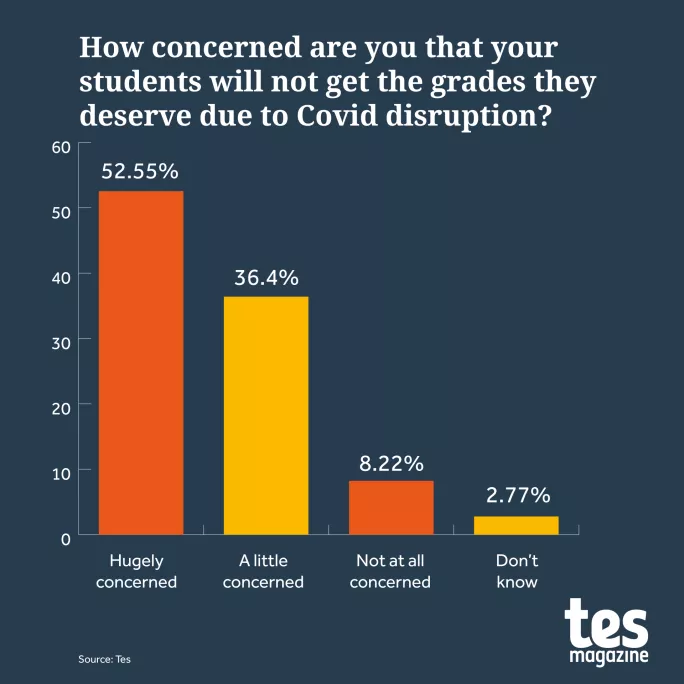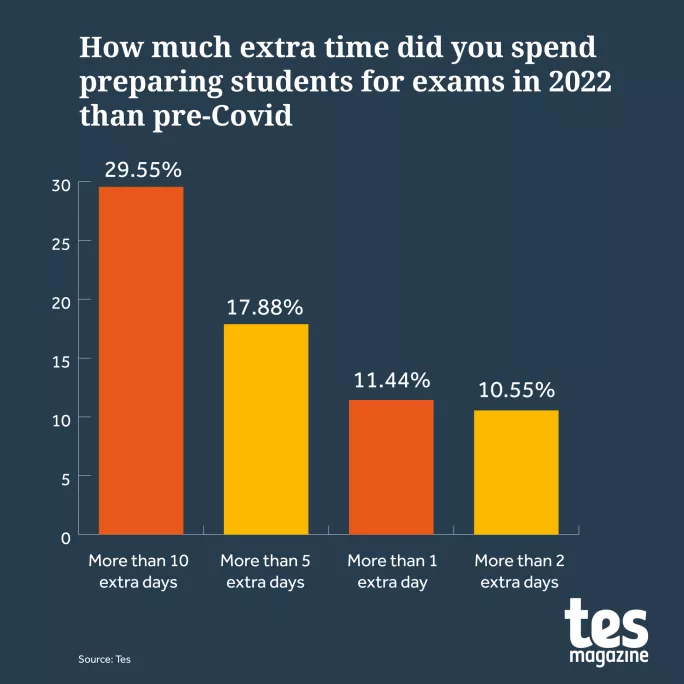GCSEs and A levels: 9 in 10 teachers fear grades will be unfair

Almost nine in 10 teachers are concerned that their students will not get the GCSE and A-level grades they deserve because of disruption caused by the pandemic, a Tes survey reveals.
And over half (53 per cent) of teachers are hugely concerned about the grades their students will receive due to Covid.
In a Tes survey, which received over 900 responses from teachers, heads of department and school leaders who have been involved in the teaching of exam students this year, 89 per cent of respondents said they were concerned their students’ grades would be depressed because of Covid.
- GCSEs 2022: Summer exams “likely to widen disadvantage gap”
- Sutton Trust: 2022 exams not “fair”, say nearly half of teachers
- Exams: Ofqual to check exam-aid error impact on grades
This summer’s exams marked the return to “normal” assessments after two years of teacher- and centre-assessed grades, with exams being cancelled due to the pandemic.
Only 8 per cent of respondents said they were not concerned that their students’ grades would be affected, while 3 per cent said they did not know.

One teacher told Tes that the “main difficulty” for their students was the fact that none of them had sat public exams before and so “had no idea of the sense of urgency and importance about revision and preparation”.
They added that some students “didn’t seem to believe exams would go ahead and thought evidence collected by teachers throughout the year would be used instead”.
Another head of department said it was “ridiculous” that the cohort that had been “most affected by Covid disruption” was not also awarded teacher-assessed grades.
Meanwhile, a school leader told Tes that the attainment gaps between disadvantaged students and their peers were “widened” due to “poorer attendance and mental health issues”.
Data compiled by FFT Education Datalab, exclusively revealed by Tes, showed that disadvantaged GCSE students had missed an average of eight weeks of school by January this year since they started Year 10 in autumn 2020 - on top of the two months they were learning remotely when schools were closed in early 2021.
GCSEs and A levels 2022: ‘Disproportionate’ Covid impact
The Tes survey underlines previous concerns about the uneven impact of Covid on students in different parts of the country.
Almost two-thirds of the teachers who were “hugely concerned” about the impact of Covid on grades were in the North East (64 per cent).
The region with the lowest percentage of teachers who were “hugely concerned” was the South East.
Following A-level results day last year, when students received teacher-assessed grades (TAGs), teacher leaders in the North warned that the Covid pandemic had had a “highly disproportionate” impact on their schools.
Figures published by Ofqual at the time revealed that the North East was the only one of nine regions in England that had seen the proportion of C grades and above drop compared with 2020.
One teacher who responded to the Tes survey said some schools and regions were “disproportionately affected by Covid throughout Year 10 and 11”.
“The exams were not changed significantly enough and grade boundaries [should be] lowered to reflect this,” they added.
More time spent preparing students for exams
Meanwhile, almost one-third (30 per cent) of respondents said they had spent more than 10 extra days preparing students for exams this year compared with their previous cohorts before the pandemic.

Almost one-fifth (18 per cent) of respondents said they had spent more than five days of extra time preparing, and 11 per cent said they had spent more than two days.
Advance information for exams criticised
Advance information on exam topics was released in February, with the aim of helping students to focus their revision.
However, in the Tes survey, over a third (35 per cent) of respondents said they felt the advance information was “useless”.
Almost half (47 per cent) felt the information provided was “somewhat useful” and just 12 per cent said it was very useful.
One teacher said that the advance information might have been made more useful through “independent standardisation” and “better timing”.
In January, leaders called for the advance topics to be released before February due to the disruption caused by the Omicron variant of Covid-19.
There were also concerns over the fairness of the adjustments across the board, with one teacher saying “the adjustments made for each exam were not equal”.
Students affected by exam board mistakes
The survey also reveals that more than half of teachers felt their students had been affected by the mistakes in the advance information issued by exam boards.
Some exam papers this summer included topics that students had not been made aware of and therefore had not revised.
An Ofqual spokesperson said the watchdog was so “so grateful” to the teachers and support staff who had enabled students to be awarded grades this year.
The spokesperson said Ofqual research had shown that nine in 10 students had reported that advance information “helped them in their exams, in at least some of their subjects, for instance, to focus their revision and feel more confident”.
The spokesperson also said that the Tes survey “does not chime with what we have found when we talk to students, teachers and school leaders”.
“Our chief regulator, who was appointed last September, has visited schools and met students across the country. We have found that they have welcomed the return of exams as well as the unprecedented package of support that was put in place in light of the impact of the pandemic,” they said.
“Grading is lenient this year. While we have gone back to normal exams, we didn’t think it was fair to students who have suffered disruption to their learning to go back to pre-pandemic grades in one go.”
You need a Tes subscription to read this article
Subscribe now to read this article and get other subscriber-only content:
- Unlimited access to all Tes magazine content
- Exclusive subscriber-only stories
- Award-winning email newsletters
Already a subscriber? Log in
You need a subscription to read this article
Subscribe now to read this article and get other subscriber-only content, including:
- Unlimited access to all Tes magazine content
- Exclusive subscriber-only stories
- Award-winning email newsletters
topics in this article



